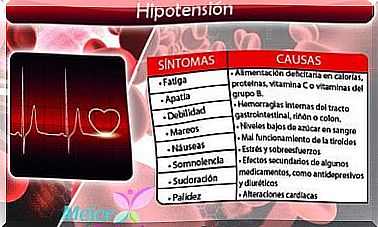Recommendations For People With Anticoagulant Treatment
Anticoagulant treatment, as its name suggests, is one that is used to prevent the blood from carrying out the clotting process. Thus, it prevents thrombi from forming that can put a person’s health at risk.
This treatment includes different medications that, by making the blood take longer to clot, reduce the incidence of thromboembolic disease. This pathology consists in that a thrombus, which is a clot within the circulatory system, when circulating through the blood vessels, plugs a vein or artery, preventing the blood from reaching the tissues correctly.
Currently, many patients need anticoagulant treatment. In fact, it is estimated that around 2% of the general population needs it; the vast majority of that percentage are people over 65 years of age.
However, these types of treatments need strict control. There is a high risk of side effects, such as bleeding. Therefore, in this article we explain some recommendations that people with anticoagulant treatment should follow.
What is anticoagulant treatment used for?
Anticoagulant treatment can follow different guidelines and forms of administration. First, oral anticoagulants are used in people with atrial fibrillation.
Atrial fibrillation is a cardiac arrhythmia. That is, it is an alteration of the normal rhythm of the heart. Unfortunately, it is very frequent, since it affects almost 9% of the Spanish population. In addition, the number of affected people increases with age.
What happens is that atrial fibrillation increases the risk of clots forming inside the chambers of the heart. Thus, these clots tend to break loose and advance through the blood, being able to obstruct any vessel and cause an embolic accident.
On the other hand, anticoagulant treatment is also used in people who have had a heart prosthesis fitted and in those who are at high risk of venous thromboembolism. Other indications for this treatment are:
- Prevention of acute myocardial infarction, especially in people who already have an arterial disease, such as atherosclerosis.
- People at risk of strokes.
- Patients who have suffered several heart attacks.
What recommendations should be followed with anticoagulant treatment?
As we have already mentioned, this treatment must be properly controlled, since slowing blood clotting increases the risk of bleeding. To do this, you need to have a blood test every 4 weeks at the most.
Anticoagulant treatment must be prescribed and permanently followed by a doctor or nurse. They will be the ones to set the exact dosage. The ideal is to take it every day at the same time and not forget to do it. If you ever forget to take the prescribed dose, you should never take a double dose to compensate.
Similarly, every time a new medicine needs to be taken, it is necessary to consult with the doctor. This is so because these types of drugs have a high risk of reacting with other drugs.
In addition, it is very important to be aware that this treatment should not be stopped without the doctor’s instructions.
What other recommendations are appropriate?
It is very important that, when you are under anticoagulant treatment, you avoid drinking alcohol and smoking. In addition, there are studies that state that you have to watch your diet. These drugs interfere with the metabolism of vitamin K.

Vitamin K is a vitamin that enables the clotting process. It is present in many foods such as spinach, the liver of animals or other vegetables. Therefore, it is necessary to control the intake of this type of food. It is recommended to limit foods with vitamin K to two servings a day maximum.
Another basic recommendation is to be aware of any type of bleeding. For example, if you see blood in your stool, urine or coughing, the ideal is to go to the doctor, even before the appointment.
In the case of women of childbearing age, if they want to become pregnant, they should consult it first. Blood thinners can interfere with pregnancy. The same happens if you need to be operated.
In conclusion
All those who need anticoagulant treatment must correctly follow all the controls with the doctor. It is important to know that these are drugs with many risks that cannot be taken lightly.








